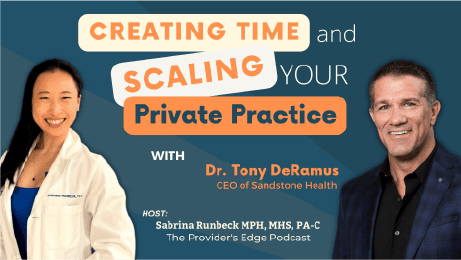
5 Best Tips To Harness
The Power Of Metabolic Health
Into Current Healthcare Practice
Healthcare should be more focused on the prevention of disease. Rather than the diagnosis of sick problems.
In this episode, we discussed the importance of metabolic health and different aspects of it in your patient’s life.
Your patient can adapt these to their practices by fixing their vision and with the help of the right information.
Our feature guest today is Dr. Philip Ovadia, MD, who has graduated from Jefferson Medical College and then completed a general surgery residency at UMDNJ Robert Wood Johnson medical school, and a cardiothoracic surgery fellowship at Tufts, New England Medical Center. After 15 years of practicing as a cardiac surgeon, he realizes how important metabolic health is! Now he runs a telemedicine practice focused on improving metabolic health and teaching people to stay off the operating table.
He shared his valuable inputs related to metabolic health, myths that we blindly believe are not true, principles of sound health, and insights into the current healthcare system that needed to be addressed.
To connect with Dr. Ovadia find him links below:
LinkedIn: https://www.linkedin.com/in/philip-ovadia-heart-health/
Facebook: https://www.facebook.com/Ovadia-Heart-Health-104059302011549/?ref=pages_you_manage
Twitter: @ifixhearts
Listen anywhere you get your podcastin' on.
Live Interview

A study by the University of North Carolina showed that 88% of the adults in the United States are not metabolically healthy. 40% of the people with normal weight are metabolically unhealthy as well. Normal weight isn't necessarily considered to be a metabolically healthy body. Looking at healthcare professionals specifically, a Columbia University study showed that more than 45% of primary care physicians are obese.
Dr. Philip Ovadia, MD has been working on improving metabolic health and teaching people to stay off the operating table. What we eat determines how long and how well we live. Yet most doctors don’t learn that in medical school.
What’s worse? Pharmaceutical companies and food manufacturers are vested in the public not knowing how to live and eat metabolically healthy. Food permits are mostly designed by no physicians and based on poor data do put us at huge health risks over time.
What Is Metabolic Health?
The most comprehensive definition of metabolic health is how well the body creates, manages, and directs energy. Metabolic health is generally tracked through five factors: blood sugar, blood pressure, cholesterol, body composition (weight), and triglyceride levels. Should three or more of these be outside normal ranges, you would be diagnosed with metabolic syndrome.
Your patients’ metabolic health affects many aspects of their life, including core functions such as:
- Hormone function and regulation
- Blood sugar and blood pressure management
- Overall heart strength and operation
It’s important to note that metabolic health is not the same as physical health. Your patients can feel strong, alert, and ideally in shape, yet still have poor metabolic health. This can happen to you, a healthcare leader, too if you aren’t watching these five factors.
Myths About Metabolic Health
There are some popular myths that are not only delusional to normal people but also to doctors, physicians, and health-related service providers. Whenever a patient consults with a physician, the specialist here should be able to convey the right information, eliminate disbelief and guide towards correct paths.
People Can’t Control Their Own Metabolism
Do you agree that your patients often believe they don't have control over their health? More often, they need to be relying on their doctors and health care system to maintain sound health. Whether the reality is that each one of us has the power to take charge of our health. We can find the tools and habits that are going to keep us healthy. In this case, if we already have diseases like Type two diabetes or high blood pressure, these are oftentimes reversible. People love to stay passive participants in their own health while looking for support from their doctors and the health care system. As healthcare leaders, you have the responsibility to educate your patients to take an active role, instead of being passive participants. Practicing patient-centered care means empowering your patients to make their own choices.
Thinner People Have A Higher Metabolism
Some of your patients seem to be able to eat as much of any kind of food as they like and not gain weight. You might have wondered if it is because they have a naturally faster metabolism? Actually, many thinner individuals have slower resting metabolisms than larger people. However, the number of calories burned per day is most affected by the amount of muscle a person has. Muscles burn calories. According to research, boosting strength training e.g. HIIT (high-intensity interval training) helps accelerate weight loss much faster than diet alone.
Reasons For Getting Obese And Consequences Of An Unhealthy Diet
Metabolic health basically refers to the body's ability to be properly utilizing the inputs that we're giving. Some of the foods we put in our bodies get immediately turned into energy to fuel. Some of this energy is used to build and rebuild our tissues, which constantly go on within our bodies. After that, a little bit of it’s supposed to go into storage during the times when foods are not available.
Poor metabolic health is the root cause of most of the chronic diseases that we face today. Diabetes, heart disease, Alzheimer's disease, and many forms of cancer are related to unhealthy metabolic health. Today, we've gotten to a point where many of our patients are eating just about all the time. What ends up happening is too much energy gets stored, and that stored energy never gets utilized. Eventually, these stored energy starts to spill over and create toxic effects throughout our bodies.
Principles Of Metabolic Health
Your patients need the right mindset to bring the long-term benefits of sound metabolism health. Some principles that have been shared to change their health and life are very doable and sustainable in Dr. Philip Ovadia’s book named “Stay Off The Operating Table.”
Mindset Type Principle
Short-term goals like losing 20 pounds, hardly develop a patient’s sound metabolic health. Whenever they focus on such short-term goals, they will likely lose their dietary routine after reaching their weight goal and then end up gaining those weight back as before. What’s more detrimental to these patients is after failing to reach their goal, they get down on themselves.
Eating Real Food
Your patients should eat the plants that grow in the ground, and the things that eat the plants that grow in the ground. To change your patients’ metabolic health, healthcare professionals should advise your patients to eat the type of animal products and, plant products, as close to their natural form as possible. They should be eliminating the processed food, the stuff that comes in boxes or sealed bags.
Priority For Physicians Whenever Working With Their Clients
The job of physicians and health practitioners has always been to educate their patients about the choices they can make. They also need to address the consequences of the patient's own choices. Rather than just forcing them to undertake one preferred decision. If you impose a diet plan on your audience without even taking into account their preferences or way of life, they won't be benefitted. Because they would hardly be persistent very long in it.
Common Issues Of People While Figuring The Best Way To Live A Metabolically Healthy Life
People have been mostly seeking help regarding the problems of heart disease, diabetes, and blood pressure, which turned out to come up from the same root cause of poor metabolic health, mostly from the foods that they are eating. Fixing metabolic health can help in getting better at their related diseases at the same time.
Diet Plans For Different Types Of Ethnicity, Religion, Lifestyle, And Preferences Of People
A lot of the popular sort of diet plans of the day have been introduced. That should include everything from vegan to carnivore, things like Paleo and Mediterranean, and other low-carb diets. People would like to figure out from a framework what works best for them and suits their personal preferences in terms of preference, lifestyle, religious and ethical beliefs, and concerns that come into this. Finally, try out different stuff to look for the one that works best for them.
What Should A Consumer Pick? Organic Labeled Produce Versus Nearby Farmer’s Market Produce
The practice of organic food is praiseworthy, but the problem is that organic labeled food doesn’t necessarily mean much.
Recommended Podcast Episodes
Ep 55
Embracing Food Identify:
Healing modern-day gut issues through traditional healing foods with Dr Sara
Be a guest on our show
The Provider's Edge podcast is always looking to feature healthcare business owners and Health Tech Founders to highlight their work and their stories.
Together, we can encourage other practitioners to up level their practices.
If you or someone you know could be a good fit as a guest on the show,
please click on the bottom below to apply as a speaker.
Healthcare Entrepreneurs!
I can help you accelerate your social mission and increase profitability by gaining visibility and credibility in the right circle of influence.
By combing my expertise in hosting a highly-ranked podcast and speaking at various global healthcare conferences and TV channels, I found the best way to create long-lasting business growth in healthcare is through connecting with the right circle of influence.
I understood your visibility is your profitability!
My clients stop having to worry about where their next client is coming from, need to plan additional budget for ads spend, or lose the ability to connect with others because their social media account is shut down.
If you want to share your social mission with the world and gain endless supporters that become royal clients... then you have landed on the right page, with the right consultant who is also a recovered clinician.




